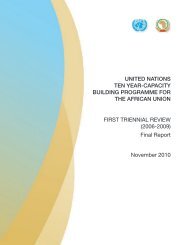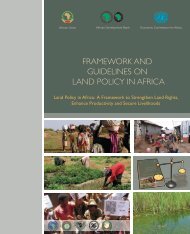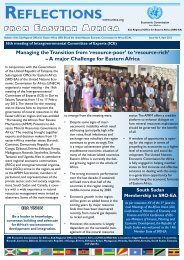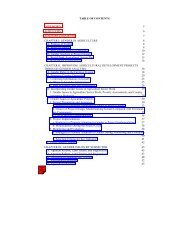A Decade of NEPAD - Economic Commission for Africa - uneca
A Decade of NEPAD - Economic Commission for Africa - uneca
A Decade of NEPAD - Economic Commission for Africa - uneca
You also want an ePaper? Increase the reach of your titles
YUMPU automatically turns print PDFs into web optimized ePapers that Google loves.
84 A <strong>Decade</strong> <strong>of</strong> <strong>NEPAD</strong>: Deepening <strong>Africa</strong>n Private Sector and Civil Society Ownership and Partnership<br />
years should create effective channels to popularize NE-<br />
PAD within the Diaspora and to mobilize technical and<br />
financial resources from within the Diaspora in support<br />
<strong>of</strong> <strong>NEPAD</strong>. Furthermore, those <strong>NEPAD</strong> focused CSO’s<br />
involved with conflict resolution, post conflict redevelopment<br />
and peace and security will have an expanded<br />
portfolio to work with under the new expanded mandates<br />
<strong>of</strong> the <strong>Africa</strong>n Union Authority.<br />
Recognizing that ownership sentiment also comes with<br />
opportunities to become involved in the planning and<br />
delivery processes <strong>of</strong> <strong>NEPAD</strong>, a significant increase in<br />
programmatic involvement by <strong>Africa</strong>’s private sector and<br />
CSO community is also bound to engender increased<br />
feelings and incidences <strong>of</strong> grass roots <strong>Africa</strong>n ownership.<br />
Today, in part in response to the evolutionary processes<br />
mentioned above, there is unprecedented opportunity <strong>for</strong><br />
<strong>Africa</strong>n stakeholders to become meaningfully involved in<br />
<strong>NEPAD</strong> initiatives and greater resources to support the development<br />
and delivery <strong>of</strong> <strong>NEPAD</strong> projects. Additionally,<br />
Accelerating ownership and engagement<br />
with the <strong>Africa</strong>n Private Sector<br />
The AU/<strong>NEPAD</strong> 2010-2015 <strong>Africa</strong>n Action Plan<br />
The AU/<strong>NEPAD</strong> <strong>Africa</strong>n Action Plan 2010-2015 provides<br />
a comprehensive project opportunity overview .<br />
The elements <strong>of</strong> the Action Plan are organized under<br />
nine sectors:<br />
ӹ Infrastructure (Energy, Water and Sanitation, Transport,<br />
and ICT)<br />
ӹ Agriculture and Food Security<br />
ӹ Human Resource Development (Health, Education,<br />
Youth and Training, and Social Affairs)<br />
ӹ Science and Technology<br />
ӹ Trade, Industry, Market Access & Private Sector<br />
Development<br />
ӹ Environment and Climate Change, and Tourism<br />
ӹ Governance and Public Administration, Peace and<br />
Security<br />
ӹ Capacity Building<br />
ӹ Gender Development<br />
more resources than ever have been identified and mobilized<br />
to specifically support <strong>Africa</strong>n-led, broad based,<br />
participatory, <strong>NEPAD</strong> implementation programmes and<br />
these resources can be harnessed to engender increased<br />
<strong>Africa</strong>n ownership in the <strong>NEPAD</strong> programmes.<br />
While institutional ef<strong>for</strong>ts must continue to create space<br />
<strong>for</strong> <strong>Africa</strong>n CSO engagement and <strong>Africa</strong>n private sector<br />
participation by the <strong>NEPAD</strong> Secretariat and within<br />
REC and national focal point structures, actual project<br />
involvement is, arguably, the fastest way to rapidly expand<br />
ownership and participation within <strong>NEPAD</strong> processes.<br />
Toward this end, four distinct <strong>NEPAD</strong> related programmes<br />
present unique and tangible opportunities <strong>for</strong> private<br />
sector and CSO engagement with <strong>NEPAD</strong>. Although the<br />
private sector and <strong>Africa</strong>n CSO community have space<br />
<strong>for</strong> contribution in all four projects, two <strong>of</strong> the initiatives<br />
hold comparatively more opportunity <strong>for</strong> CSO engagement,<br />
and two hold comparatively more opportunity <strong>for</strong><br />
private sector engagement:<br />
Within these nine sectors 80 programmes and projects<br />
have been prioritized <strong>for</strong> implementation during the 2010-<br />
2015 timeframe:<br />
ӹ 19 projects are at stage 1: programme/ project<br />
identification<br />
ӹ 25 projects are at stage 2: feasibility/ needs assessment<br />
ӹ 29 projects are at stage 3: programme/ project structuring<br />
and promotion<br />
ӹ 7 projects are at stage 4: implementation and operations.<br />
The revised AAP also contains “Emerging Priorities” that<br />
are additional programmes and projects that will create<br />
a pipeline <strong>for</strong> the future and include selected regional<br />
priority projects that are not included in the AAP as pan-<br />
<strong>Africa</strong>n priorities.<br />
The total cost <strong>of</strong> implementing the stage 3 and stage 4<br />
priority programmes and projects is estimated at US$10.2<br />
billion and US$3.3 billion has been committed toward their







